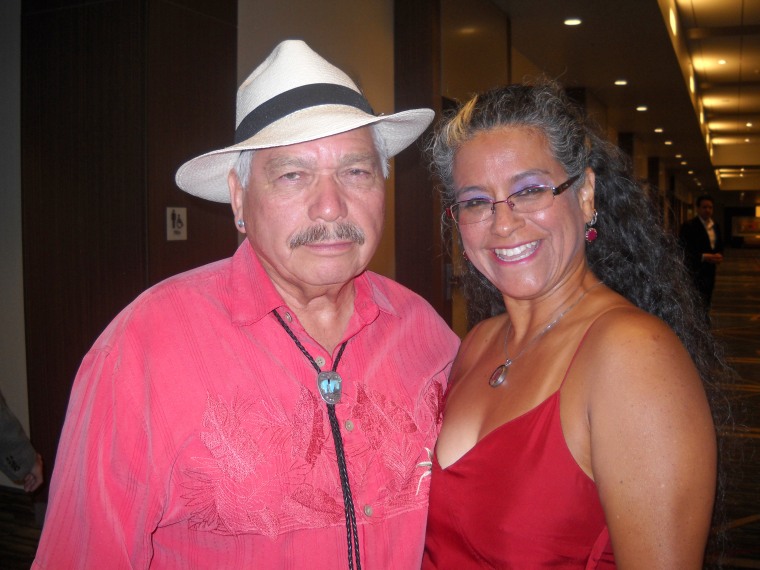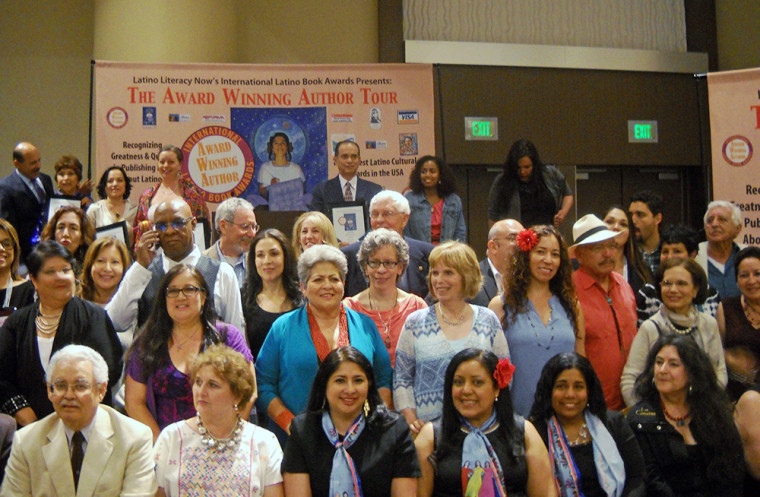SAN FRANCISCO, CA -- Imagine a book that tells the story of the Mexican revolution from the perspective of a pack of chihuahuas. That’s the premise behind an entertaining young adults book, The Wild Chihuahuas of Mexico, one of many featured publications at the 17th Annual International Latino Book Awards, held June 27 in San Francisco. Written by Los Angeles writer Traude Gómez Rhine, the book tells of how the diminutive dogs helped win the revolution.
“It’s a story about leadership and following your heart,” Gómez Rhine said, adding that while the story is fiction, the research is real. “Students learn about what the revolution was all about and what they were fighting for.”
Gómez Rhine’s book, which took first place in the Best First Book category, was one of many books featured at the event that highlighted a slew of categories, from childrens and young adult literature in Spanish and English, to historical fiction, travel, cookbooks, and current events.
Marjorie Agosín, a poet and Wellesley College professor of Latin American Literature, wrote about a young girl’s experience during a period of political turmoil in Chile in the 1970s. Agosín says that I Lived on Butterfly Hill, which won for Best Young Adult Fiction, mirrors her own experience leaving Chile after a military coup. “My story takes place in a particular time and place, but everyone relates to the story. Writing is universal. A writer is a voice for humanity.”
According to Publishers Weekly, Latino consumers are more likely than others to buy books for children and young adults, and those categories figured prominently at the San Francisco event.
The number of Latino authors – and Latino agents and book editors for that matter – is not where it should be, said those in attendance at the awards.
“It’s important that the youth voices get heard and validated,” said Sarah Rafael García, founder of Barrio Writers, a non-profit creative writing summer workshop program that takes place in various cities across the country and which publishes an anthology of youth writers.
Publishers Weekly also reports that sports and references books sell well among Hispanics, and interestingly enough, horror books. PW reports that Hispanics are 9 percent more likely than non-Hispanic book buyers to purchase those publications with scary stories.
But even though Latinos represent the nation’s fastest-growing ethnic group in the country and have already outpaced other groups in several major cities with a buying power that exceeds $1 trillion nationwide, the number of Latino authors – and Latino agents and book editors for that matter – is not where advocates say it should be.
“Latino literature has been relegated to the non-mainstream and it’s important to start elevating that so that it’s understood that yes we are part of the U.S.,” said awards spokesman Jesús Mena. “The biggest challenge is we are categorized as Latino authors and therefore it is a niche audience. What’s sad to me is there are authors from other groups, yet no one thinks twice about not including them in the mainstream. Latino authors still get that niche treatment and to me it’s not appropriate.”
It’s important too for writers to look at lesser-known publishing houses, says Claudia Meléndez Salinas, an award-winning California journalist who publishes her first novel, A Fighting Chance in October.
“It’s been such an uphill battle for Latinos to be represented. There is so much good material but some people don’t get you when you are Latino. They want to change the character, they want to change the story. Our voice is not really well understood,” said Meléndez Salinas, who is publishing her book through Arte Público Press, founded in 1979 and is one of the few publishing houses willing to look at manuscripts not submitted through an agent. Meléndez Salinas’ book is a young adult’s novel about a young man’s attempt to stay away from gangs by joining a fight club. “I wanted this story to be about us.”
The 17th Annual International Latino Book Awards took place as a part of the American Library Association’s annual conference that brought together more than 10,000 attendees and is a key market for Latino authors, says the event organizers.
“It’s a very important part of getting the word out. Putting more Latino authors and Latino-themed books into the libraries and schools tend to make them more mainstream,” adds Mena.

Rebecca Barrera, Director of Hispanic Initiatives at the New York-based publishing house Scholastic told the gathering of several hundred attendees of the kind of impact Latino writers have. “If it wasn’t for you there would be no diversity in the publishing industry. The books you write inspire us, they fill our cultural souls in a way that others can’t do.” Barrera added that it’s also important to push for greater inclusion of Latino authors. “Latino books and Latino content books are not just for Latinos. Everyone needs to know who we are. The books that you write help us build bridges between the many cultures of our country, especially right now when it’s such a tense time and the lack of understanding of our diversity is so apparent. You can make a difference, you can turn that around.”
A growing part of the publishing industry is going the do-it-yourself route, and several honorees brought their books to market in precisely that way.
According to Digital Publishing News, the self-publishing market is growing, up 17 percent in 2014 from the previous year. “The Wild Chihuahuas of Mexico” was self-published, and while it was writer Gómez Rhine’s first novel, the self-publishing route has been catching on with some well-established authors.
“Normally I get published by major publishing houses,” writer Víctor Villaseñor told NBC. The author of the best-selling Rain of Gold says that for his latest novel, Revenge of a Catholic Schoolboy, “My regular publishers didn’t want to do it so I had to publish it myself. They told me this book was too far out for them.”
Follow NBC News Latino on Facebook and Twitter
.
